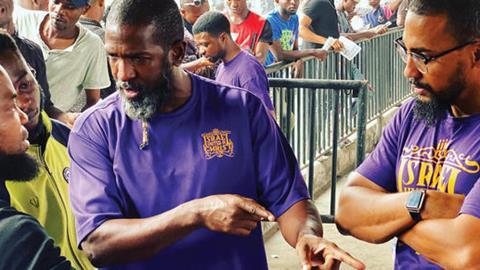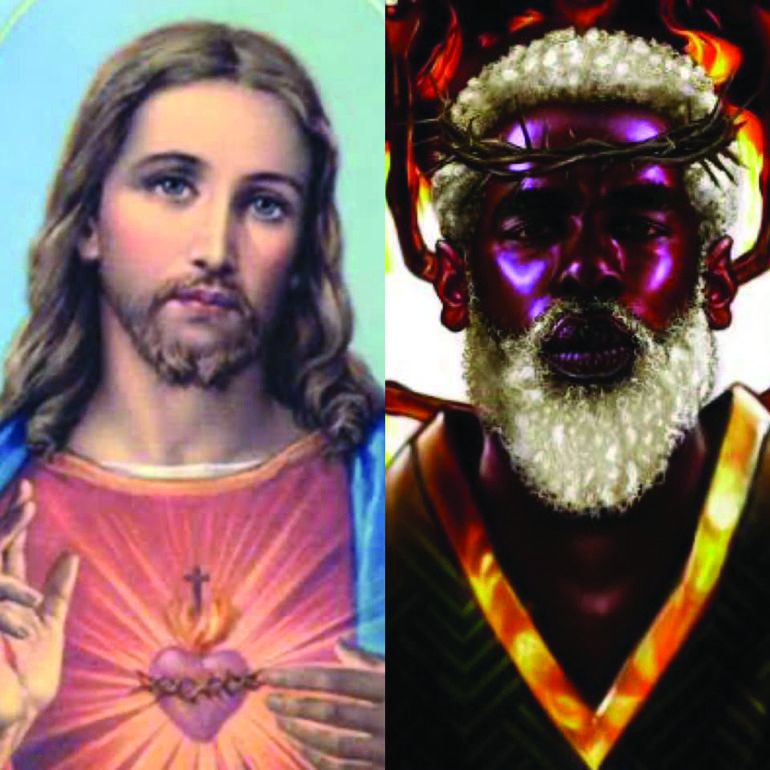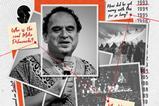Megan Cornwell investigates the sect that believes African Americans are the true Hebrew Israelites
I first noticed them one Saturday morning in Peckham, south-east London, while I was walking down the busy high street to catch the bus. Among the market stalls slippery with rainbow trout and bulging with piled-high plantain stood a group of young men dressed unusually. They were holding Bibles and shouting angrily at passers-by. “Christians with an overactive sense of God’s judgement and not enough grace,” I thought to myself, as I absent-mindedly waited for the 343. But as the message grew louder and the voices reverberated around me, I listened more attentively. This didn’t sound like any preaching I had heard before. I moved closer, curious to know what church they were part of.
“We’re not from a church,” the ringleader scoffed loudly. “OK, so what do you believe?” I asked. What followed was the definition of a quasi-religious group whose main tenets appeared to be that Jesus is black, people of colour are the true lost tribes of Israel and that the Messiah will return to judge and enslave all white people.
I tried my best to challenge some of what these men were saying, but after a few minutes I could see our conversation wasn’t bearing much fruit and, by this point, my bus was arriving, so I said goodbye. As we pulled away into the pandemonium of weekend traffic in London, I felt unsettled. What was this ‘gospel’ these men were so zealous about?
Months later I was scrolling through the news on my phone, when I came across a story about a missing woman called Joy Morgan who had last been seen at her church. When I googled the name of the church: Israel United in Christ (IUIC), the search engine brought up images of young men dressed in a similar – though not identical – fashion to those I had met in Peckham. Strange. What was the link between these two groups?
Research led me to discover that IUIC is one of many groups that make up a movement known as the ‘Black Hebrew Israelites’. Because of the anti-semitic and anti-white beliefs held by some adherents, 22 Black Hebrew Israelite organisations have been labelled hate groups by the Southern Poverty Law Center, a body responsible for monitoring extremists in America.
Who are the Black Hebrew Israelites?
“Most of what the [Black] Hebrew Israelites teach is not good news,” explains Vocab Malone, an urban apologist from the United States who has been researching the movement (which originated in the US) for the last decade. “It’s an ethnocentric, mutilated version of the biblical message and it involves all kinds of distortions, such as a massive distortion of large swathes of the historical record.”
Malone interacts with Black Hebrew Israelites through conversations with street preachers, which he records and uploads to his YouTube channel for evangelistic purposes, and through private meetings with members to gain a better understanding of their worldview.
He tells me there is “great divergence” in beliefs among those who adhere to the ideology, with many more moderate wings existing that would not be classified as hate groups. What unites the movement, however, is the belief that descendants of enslaved Africans brought to America during the transatlantic slave trade are the true biblical Israelites. They believe these people, who now primarily live in the western hemisphere, are in need of being ‘woken up’ to their true identity.
The most extreme groups preach that salvation is only for so-called Israelites, which, in some instances, includes Hispanics and Native Americans. Others say that all Gentiles (anyone who, within their worldview, is not a descendent of African American slaves) can be saved, but only if they recognise “Israel’s true identity”, and even then, they will only be servants in the kingdom of God. Some say Jewish people are imposters who have stolen their identity and white people are the devil personified.
Although Malone describes the views of the Black Hebrew Israelites as “historically, biblically ludicrous” he tells me their ideas are becoming “more credible” in an age where fake news is rife. "And here’s the real reason why – I think it’s because there is a deep moral, emotional and existential need that’s not being met. Hebrew Israelism, people feel, is meeting those deep existential needs.”
Felix Aremo, who trains missionaries for London City Mission, and who, like Malone, is interested in the movement from an evangelistic perspective, agrees. “The battle isn’t an intellectual battle of who has the right facts,” he says. “It’s actually an emotional battle of who’s able to heal the hurt that has been experienced in the past and that is being experienced today.
“I think the thing that makes the Hebrew Israelites attractive is the fact that they affirm black identity. They’re able to make an emotional appeal to black people based on the injustice that black people experience. They have a coherent narrative which explains black people’s suffering, and they have a solution.
The Messiah will return to judge and enslave all white people
“And so to have a group that is ethnocentric, and saying: ‘Black people, you’re Israel, you’re God’s people, God loves you, he’s for you, he sees the suffering that you go through, he wants to save you out of it’, that’s really, really attractive, because it’s saying: ‘Throughout my whole life I’ve experienced, in direct and indirect ways, that I am less than, that I am worthless, that I am inferior. And here is a group saying: ‘No, actually, the reverse is true. You’re actually superior. You’re actually chosen by God.’”
The kind of suffering Aremo is talking about is evidenced by studies such as the one undertaken last year by the Centre for Social Investigation. It found that applicants from minority ethnic backgrounds had to send 60 per cent more job applications to get a positive response from an employer than their white British counterparts. Researchers had made fictitious applications from identical ‘candidates’ with their names being the only variable. This, and a host of other inequalities, are exploited by the Black Hebrew Israelites as they spread their message.
Aremo describes a YouTube video that was put online by one group operating in the UK – the Israelite School of Practical Knowledge (ISUPK) – as an example of the kind of gospel being preached in London (watch video below). “They’re saying: ‘Blacks in Brixton council estates are in hell, whites in Westminster are in heaven.’ They’re saying: ‘Look at you, you’re in poverty, you’re living on a council estate, your life is miserable. Whereas, look who’s in power, it’s Boris Johnson. He doesn’t care about you. Look at all the politicians, they’re mostly white, they’re mostly middle class, they don’t care about you.’
“And they’ll say: ‘Christian churches, what good are they really doing you? They’re telling you to love your neighbour and pray, but actually how’s that going to help you in your suffering? Your mum has been praying, your grandma has been praying; how’s that helped them? Are you going to do the same thing as they’ve done and expect that life’s gonna be any different for you?’”
The number of people watching these videos isn’t gargantuan, but the message seems to be resonating in certain quarters. A survey conducted last year by LifeWay Research into the beliefs of more than 1,000 African Americans found that 19 per cent agreed with “most of the core ideas taught by Black Hebrew Israelites” and four per cent considered themselves to be a Black Hebrew Israelite. This was compared to 15 per cent who either firmly opposed their teaching or disagreed with most of its core ideas, and 62 per cent who said they weren’t familiar with their teachings.
Employing US census data to extrapolate the potential number of American Black Hebrew Israelites, Malone estimates it to be well over 1 million. What’s more, he says that once the 62 per cent who haven’t yet encountered the message hear the ideology, a large proportion will be converted. “It appears once people hear it, the tendency is to agree, not disagree. What does that tell you? I take that to mean there’s no inoculation against these falsehoods...”
It’s hard to know just how many Britons would consider themselves Black Hebrew Israelites, but Aremo tells me he expects groups like these to grow in the future. This is partly because the UK is influenced by trends in the States, and partly because their strategy of filming and disseminating slick apologetics videos is an effective one. The availability of these resources online meant Joy Morgan (and perhaps hundreds of others) became convinced by the group’s arguments before she ever met a member.
Whitewashing Christianity
For both Malone and Aremo the response from the Church must be as nuanced and multifaceted as the movement itself. On the one hand, it’s about Christians equipping themselves with sound biblical knowledge to counteract the factual inaccuracies presented by Black Hebrew Israelites on the streets and online, but, more importantly, it’s about creating churches that genuinely reflect the kingdom of God. Places where people of all races and backgrounds are truly welcomed as family, and where black and minority ethnic (BAME) Christians can find answers to the questions they’re grappling with. That might be the effects of racism on them personally, or God’s response to injustice more generally. It’s vital, as Malone tells me that almost all of the Black Hebrew Israelites he speaks to were once members of mainstream Christian churches. It begs the question: why did they leave?
Aremo has one suggestion: “The thing with racism is that it divides humanity into different races and it creates a hierarchy of people based on their ethnicity or just the colour of their skin. That assumption of white superiority is so ingrained within society, that it operates within Christian churches, whether we’re conscious of it or not. And so it’s not enough to every now and again hear a sermon condemning racism, and even that is rare, something fundamentally needs to change. Not just in one or two churches, but across the board; within the Church of England, within the Baptist Union, within Pentecostal churches...”
Almost all Black Hebrew Israelites were once part of mainstream churches
Latent racism in churches is something Anglicans are beginning to wake up to. Most Rev Justin Welby, Archbishop of Canterbury, recently apologised publicly for the racism Caribbean people arriving on HMT Windrush in 1948 experienced in Anglican parishes. It’s understood to be one of the main reasons why black majority churches exist in the UK today; BAME people were deliberately excluded from mainstream, largely white congregations, and so they created their own. Welby said he was “ashamed” of this history, adding that he had no doubt the Church of England was “still deeply institutionally racist”.
But what kind of racism are we talking about in 2020? Surely white supremacists aren’t rubbing shoulders with us in our Sunday services? At least not in the UK? “People can get tripped up by the term ‘racism’ because they associate it with Neo-Nazi groups and Hitler and the KKK,” explains Aremo, who is himself a British man of Nigerian heritage. “It is important to recognise that it doesn’t have to be overt, it doesn’t have to be intentional, for it to have the effect of maintaining or contributing to an unjust system or an oppressive state of affairs.”
The kind of injustices he’s talking about include the story of a black friend who had been going to an evangelical church for several years. This friend noticed that new members were being invited to meals and parties even though they had only just joined the church, whereas for her, no invitations were forthcoming. “The reason for that,” posits Aremo, “was that these new people looked more like the people who were doing the inviting.”
He also cites another example of a black Christian woman he knows being told by a white Christian man that he wouldn’t date her because: “What would my family say if I were to go out with a black person?” “That’s racism,” says Aremo. “It’s not their own racism; it’s accommodating the racism of their family and it’s putting the racism of their family above the commands of the Lord Jesus.”
Other examples include tokenism – inviting BAME congregants to be worship leaders or small group leaders just for good “optics” (ticking the ‘diversity’ box); and “negligence in evangelism, in discipleship and in leadership development to help ethnic minority groups navigate through life”.
Aremo’s challenge to fellow Christians is this: do you have close relationships with people from different ethnic backgrounds? How are you treating the people in your congregations who don’t look like you and don’t come from a similar background? “Do you treat a white businessman better than you treat a poor black single mum?”
When I call to speak with Dr Robert Beckford, I want to ask the theologian about the complex relationship between race and the Church and whether this has had a knock-on effect for movements such as the Black Hebrew Israelites. The academic has been immersed in the field of Black Theology for decades and has made several BBC documentaries exploring questions around faith and race.
His take on the sect is this: they are one of many groups, like Rastafari and others, who have rejected a Euro-centric Christian theology. Beckford believes the whitewashing of Christianity, including the representation of Jesus the Middle-Eastern Jew as a fair-haired Scandinavian, has made racial reconciliation difficult and therefore groups like the Black Hebrew Israelites have decided to go their own way and find a tradition that affirms their identity.
The way racial justice has been ignored by the Church – including Pentecostal churches, which have been “just as myopic”, he says, is also a significant factor. This has had several consequences, including clergy who are ill-equipped to understand the pastoral needs of their BAME congregants and who find it difficult to evangelise to groups other than the dominant white population. Beckford says he sees few Bible colleges or theology departments considering the apologetics questions asked by black people or studying the role of BAME people in the Bible and the early Church.
And finally, we talk about the painful issue of the Church’s historic involvement in the slave trade as a potential reason why people of colour look for answers outside of Christianity. “For African people who were on the receiving end of that, they understood colonialism as occult practices – this was evil. And therefore the Church’s participation in it meant that it was a co-conspirator, it was part of evil. So my argument is: if we take seriously the perspective of African people, then the Church, without having exorcised this past, is still demonically oppressed by its sojourn with racial terror.”
These are challenging words, and they reflect a reality that white Christians have perhaps chosen to collectively forget. The abolitionist efforts of William Wilberforce are heralded with self-righteous pride, without acknowledging the terrible role Christianity played prior to that, in defending slavery. The social justice victory of emancipation is celebrated without atoning for the historic support of a system that maimed, raped and dehumanised. It’s a scandal almost as epic as the slave trade itself, and yet it’s rarely talked about in Church circles, let alone repented of.
Soul searching
When I first encountered Black Hebrew Israelites on the streets of London I was affronted by their use of the Bible to justify abhorrent racist views. But, after speaking with apologists, theologians and academics, I now see that Christians have historically been guilty of exactly the same charge, and continue, albeit unwittingly for the most part, to sustain environments that can be unwelcoming to people of colour. It’s clear the Church needs to do some soul searching if we’re to create the authentic picture of the kingdom of God here on earth that the Bible talks about in Revelation, where “every race, tribe, nation and language” will be present. Failing to do so means being part of a system of injustice that mirrors the godless society in which we live and which could be fuelling quasi-religious movements such as the Black Hebrew Israelites. Or as Dr Beckford said, echoing the words of Martin Luther King: “Sunday morning is apartheid in London, and what kind of reflection of the kingdom of God is that?”
































